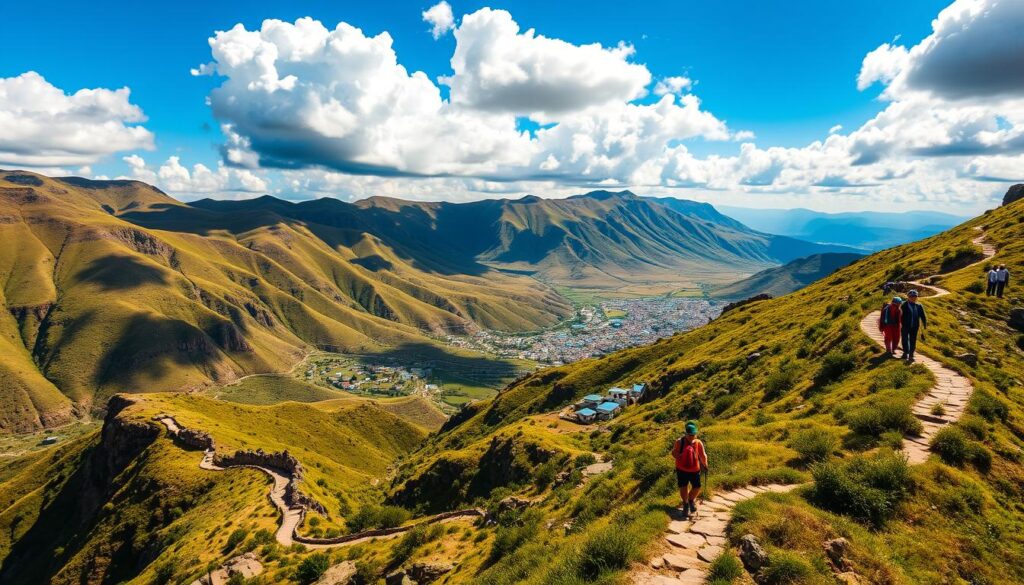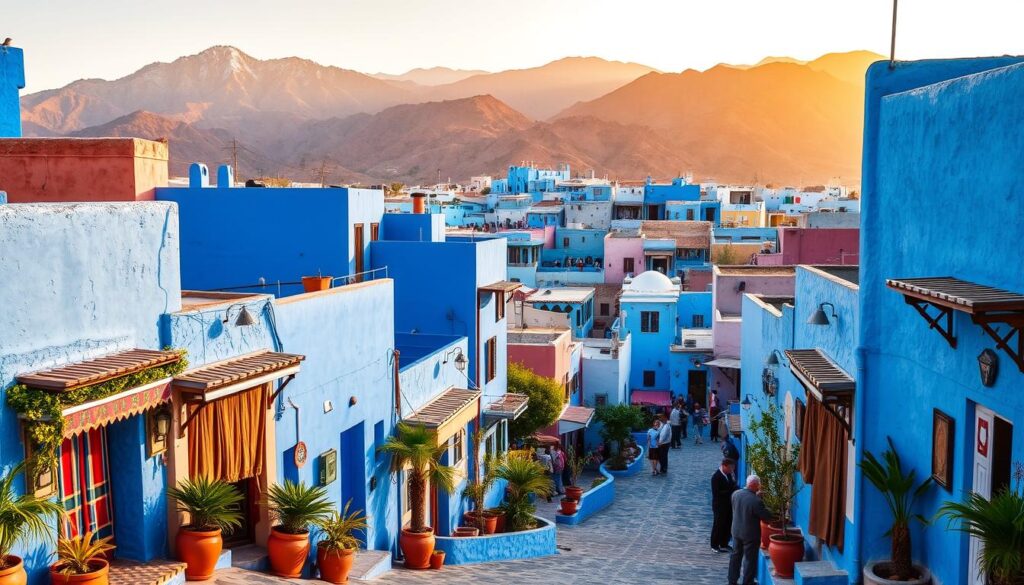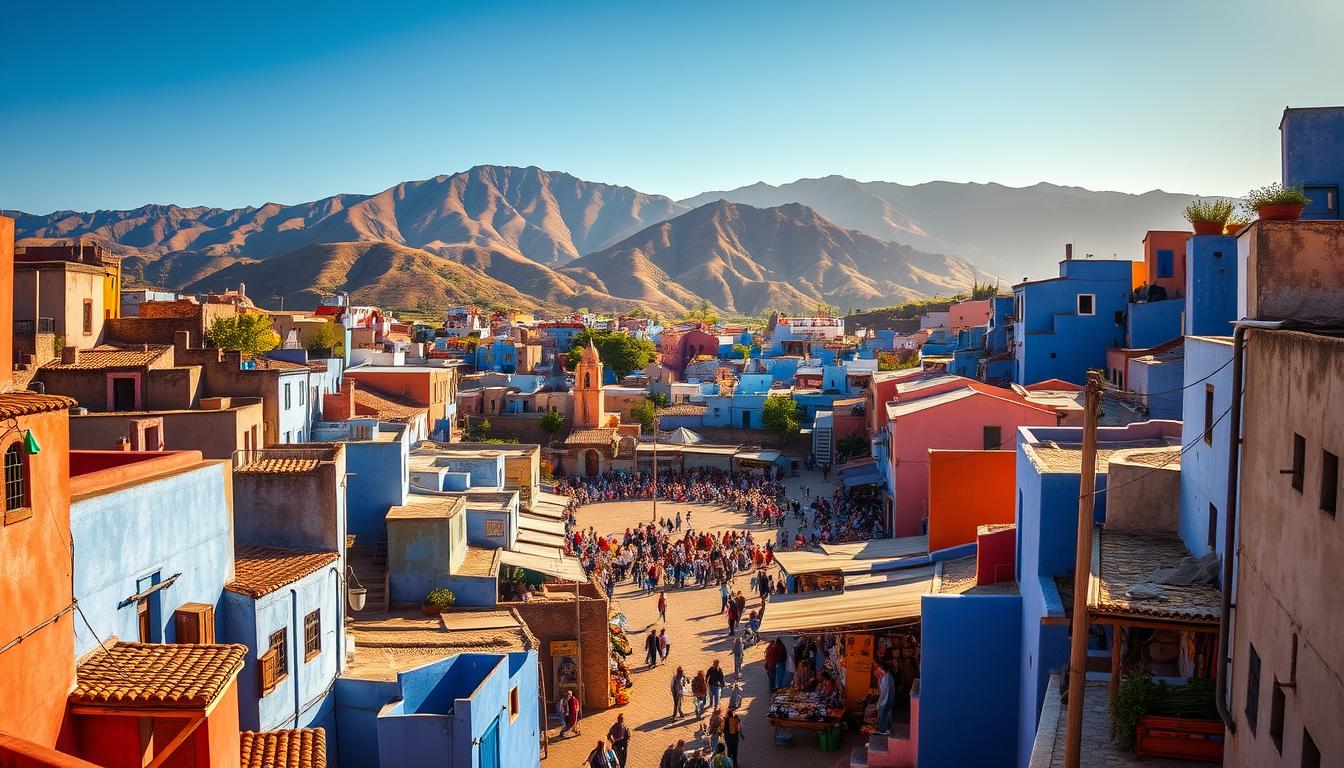What to do in Chefchaouen is Called the Blue City in Morocco?
Table of Contents
Imagine walking into a world where every wall, staircase, and doorway is painted in stunning blue. Chefchaouen, Morocco’s Blue Pearl, is more than just a place—it’s a dream come true. It grabs your imagination from the start.
This magical city sits in the Rif Mountains. It offers a special travel experience unlike any other in Morocco. The blue streets have made it a hit on Instagram, drawing in photographers and adventurers from everywhere.
Exploring Chefchaouen, you’ll find a peaceful place where blue colors fill the air. The city’s narrow streets and hidden courtyards are full of beauty. Each corner invites you to explore more of what Chefchaouen has to offer.
The city’s small size and beautiful blue colors make it stand out. Whether you love culture, photography, or just want a unique trip, Chefchaouen is unforgettable. It’s a journey into a world painted in blue.
Discovering the History and Origins of Chefchaouen
Chefchaouen is in the Rif Mountains of Morocco. It has a rich history going back to the 15th century. Founded in 1471 by Moulay Ali Ben Moussa, it was built as a fortress to fight off Portuguese attacks.
The city’s unique vibe comes from many cultures. In 1492, it became a safe place for Jews and Muslims fleeing Spain. This mix of traditions shaped Chefchaouen.
The Jewish Heritage and Spanish Influence
Chefchaouen’s blue walls come from its diverse past. Jewish settlers brought their culture and architecture. Key moments include:
- It became a safe haven for Jewish and Muslim refugees
- Spanish rule from 1920 to 1956
- Preserving its unique buildings
Why the City is Painted Blue
The blue walls of Chefchaouen have a deeper meaning. Reasons for the blue include:
- Jewish Spiritual Symbolism: Blue symbolizes the sky and heavens
- Keeping mosquitoes away
- Attracting tourists
Cultural Significance Through the Ages
Chefchaouen’s history is a mix of Berber, Jewish, Moorish, and Spanish cultures. It has grown from a fortress to a cultural hotspot. Now, it draws visitors from all over.
| Historical Period | Key Characteristics |
|---|---|
| 15th Century | Founding as a mountain fortress |
| 1492 | Refugee settlement during Reconquista |
| 1920-1956 | Spanish colonial period |
| Present Day | Cultural tourism destination |
Getting to Chefchaouen: Transportation and Travel Tips
Planning your trip to Chefchaouen means knowing how to get there. This blue city in Morocco doesn’t have an airport or train station. So, you’ll need to take a bus or drive to get there.
There are several ways to reach Chefchaouen from major Moroccan cities:
- From Tangier: It’s about 2.5 hours by car, and bus tickets cost around $6.
- From Fes: The bus ride takes about 4 hours, and tickets are about $11.
- From Casablanca: The drive takes 4-5.5 hours, and bus fare is around $18.
- From Rabat: It’s a 3-hour drive, and the bus ride takes 5-8 hours.
Bus companies like CTM and Supratours run daily services to Chefchaouen. They offer comfortable and affordable rides across Morocco. Tip: Buy your tickets early during busy seasons.
“Traveling to Chefchaouen is an adventure in itself, with scenic routes winding through Morocco’s breathtaking landscapes.”
For those on a tight budget, shared taxis (grand taxis) are a great option. They can hold up to 6 people and offer a flexible travel experience. The cost per person is usually less than private transport.
If you want more control, consider renting a car. Just keep in mind that parking in the medina is limited. Plan your parking carefully.
Exploring the Blue Medina: A Photographer’s Paradise
Chefchaouen photography spots offer a unique visual experience. The blue medina is a stunning mix of blue hues, winding streets, and architecture. It turns every corner into a photo opportunity.
Walking through the narrow alleys, you find magical photo spots. The city’s blue buildings create a magical atmosphere. It attracts photographers from all over.
Best Photography Spots in the Blue Medina
- Calle Sidi Bouchouka: Capture the most iconic blue street early morning
- Spanish Mosque Viewpoint: Perfect for panoramic city shots at sunset
- Kasbah Courtyard: Historic location with intricately detailed architecture
- Blue Steps: A must-see for Instagram fans
Popular Instagram Locations
Look for blue walls with colorful flower pots for stunning shots. The medina has many spots that show off its beauty.
Tips for Capturing the Perfect Shot
- Visit early morning to avoid harsh lighting and crowds
- Use wide-angle lens to capture narrow street perspectives
- Experiment with different shades of blue
- Respect local customs when photographing people
Pro tip: Consider paying a small fee (5 MAD) for access to some private courtyards. They offer amazing photo backdrops.
What to do in Chefchaouen: Essential Activities
Chefchaouen is a magical place with a mix of culture and stunning views. Your trip here will be filled with amazing experiences. These will leave you with memories that last a lifetime.
Begin by exploring the blue streets. These narrow alleys, painted in different blues, are a photographer’s dream. Every corner shows off beautiful architecture and secret spots.
- Visit the historic Kasbah Museum (entrance fee: 60 MAD)
- Hike to the Spanish Mosque for panoramic city views
- Explore local artisan workshops showing traditional crafts
- Shop for unique handicrafts in the vibrant medina markets
Outdoor lovers will find plenty to do outside Chefchaouen. Try hiking to Akchour Waterfalls, about 45 kilometers away. There are easy 2-3 hour walks and tougher all-day hikes.
Immerse yourself in Chefchaouen’s culture. Visit markets on Mondays and Thursdays to meet artisans and try Moroccan food. Be sure to try goat cheese and authentic tagines, showing the area’s rich food heritage.
Pro Tip: Wear comfortable walking shoes and plan your visit during spring (March to May) or autumn (September to November) for the most pleasant weather.
Spending 2-3 days in Chefchaouen is ideal. It lets you fully enjoy the city’s charm and find its hidden gems.
Local Markets and Shopping Experience
Chefchaouen markets offer a vibrant and unique shopping experience. As you wander through the blue-washed streets, you’ll find a treasure trove of traditional goods. These goods reflect the city’s rich cultural heritage.
Traditional Crafts and Souvenirs
Shopping in Chefchaouen lets you explore exceptional local crafts. The markets showcase an impressive array of handmade items. These items tell a story of local artistry:
- Intricately woven Amazigh wool rugs from the Rif Mountains
- Handcrafted leather goods from Tetouan
- Colorful ceramics from various Moroccan regions
- Traditional metal lanterns and copper lamps
- Unique silver jewelry and embroidered textiles
Haggling Tips and Etiquette
Negotiating prices is an art form in Chefchaouen markets. Here are some tips to help you navigate the shopping experience:
- Always start by being friendly and respectful
- Begin negotiations at about 40% of the initial asking price
- Be prepared to walk away if the price doesn’t feel right
- Remember that haggling is expected and part of the cultural experience
Best Markets to Visit
The most exciting shopping destinations in Chefchaouen include Uta el-Hammam square and the winding streets of the Medina. The new city market, operating on Mondays and Thursdays, attracts local vendors. It offers an authentic shopping experience.
Pro tip: Take your time exploring the markets, interact with local artisans, and enjoy the unique atmosphere of Chefchaouen’s shopping scene.
Natural Attractions Around Chefchaouen

Located in the Rif Mountains, Chefchaouen is more than its blue streets. It offers amazing natural sights for those who love the outdoors. Hikers can find trails with incredible views.
The area has many natural wonders that visitors will love. Two top hikes are:
- Bridge of God Hike: A 40-minute trail with amazing rock formations and views
- Akchour Waterfalls Trail: A 4-hour hike with waterfalls and green scenery
Here are some tips for your hike:
- Carry lots of water and snacks
- Wear shoes made for hiking
- Check the weather before you go
- Think about getting a local guide
| Trail | Duration | Difficulty | Key Highlights |
|---|---|---|---|
| Bridge of God | 80 minutes round trip | Easy to Moderate | Rock formations, mountain views |
| Akchour Waterfalls | 4 hours round trip | Challenging | Cascading waterfalls, forest trails |
The best times to hike are spring and fall. The weather is nice, between 60-80°F. Always care for nature and follow local rules.
Authentic Moroccan Cuisine and Dining Spots
Chefchaouen offers a delightful culinary journey through traditional Moroccan cuisine. The blue city’s restaurants provide an immersive dining experience. They capture the essence of local flavors and cultural traditions. Exploring chefchaouen restaurants reveals a rich tapestry of taste and hospitality.
Must-Try Local Dishes
Your culinary adventure in Chefchaouen should include these traditional Moroccan cuisine highlights:
- Tagine: A slow-cooked stew with tender meat and aromatic spices
- Couscous: Steamed semolina served with vegetables and meat
- Briouats: Crispy pastry triangles filled with cheese or meat
- Harira: Traditional chickpea soup perfect for light meals
Best Restaurants and Cafes
Chefchaouen restaurants offer diverse dining experiences at various price points:
- Casa Aladdin: Traditional dishes with reasonable prices
- Cafe Clock: Unique menu with spiced cappuccino
- Sofia’s: All-woman-run restaurant with exceptional vegetable tagine
- Lala Mesouda: Authentic dishes including unique options like Zalouk
Food Culture and Traditions
Moroccan dining is more than just eating—it’s a social experience. Traditional mint tea serves as a symbol of hospitality. Restaurants in Chefchaouen pride themselves on welcoming guests with warmth. They share meals that reflect generations of culinary expertise.
In Chefchaouen, every meal tells a story of cultural richness and tradition.
Where to Stay: Accommodation Options

Exploring the magical blue city of Chefchaouen is even better when you pick the right place to stay. The city has a wide range of hotels for every budget and taste.
From cozy traditional riads to sleek boutique hotels, there’s something for everyone. Here are some top picks for where to stay in Chefchaouen:
- Luxury Riads
- Dar Jasmine: Rated 9.5/10, featuring a refreshing outdoor pool
- Riad Cherifa: Stunning sun terrace with 9.3/10 rating
- Casa Sabila: Exceptional rooftop terrace with sweeping views
- Mid-Range Options
- Casa Amina: Best value option, rated 9.3/10
- Dar Elrio: Peaceful atmosphere with beautiful rooftop, rated 9.2/10
- Dar Echchaouen: Edge of medina with luxurious comfort
- Budget-Friendly Choices
- Riad Gharnata: Amazing breakfast, helpful staff
- Dar Rass El Maa: Lowest rates starting at $32/night
- Hotel Casa Miguel: Budget-friendly with great atmosphere
Hotel prices in Chefchaouen range from $32 to $187 per night. Most places offer free WiFi and traditional Moroccan decor. This adds to your cultural experience.
Pro tip: Book early during busy seasons. Staying at least two nights lets you fully enjoy Chefchaouen’s unique blue-painted streets.
Photography Tips for Capturing Chefchaouen’s Beauty
Chefchaouen is a photographer’s dream with its blue streets and beautiful buildings. To capture its magic, timing and preparation are key.
The best times to take photos in Chefchaouen depend on light and crowds. Here are the best times:
- Early morning (before 10 AM) for soft, diffused light
- Late afternoon (4-6 PM) for warm, golden hour tones
- Spring (March-May) and autumn (September-November) for mild temperatures
For the best shots, follow these tips:
- Bring a wide-angle lens to capture narrow street perspectives
- Use a polarizing filter to enhance blue hues and sky contrast
- Adjust camera settings for low-light conditions in shaded alleys
Remember to respect local customs while taking photos. Always ask before taking pictures of people. Some places might ask for a small fee, like the Orange Shop for a juice purchase.
If you’re on a budget, there are affordable options. Local photographers charge about $40 an hour. You can also get stunning views for free at the Spanish Mosque during sunset.
Cultural Etiquette and Responsible Tourism in Chefchaouen
Exploring Chefchaouen needs a thoughtful approach to tourism. Your travel guide should focus on cultural respect and mindful interactions. This is key to enjoying this unique Moroccan destination.
Visiting this blue city means understanding local customs is key. The community values visitors who show real interest and respect for their traditions.
- Dress modestly, covering shoulders and knees
- Ask permission before photographing local residents
- Learn basic Arabic greetings like Salam Alaikum
- Respect religious and cultural practices
Being a responsible tourist in Chefchaouen means supporting local businesses. It also means reducing environmental impact. Your choices can help the community’s economy.
“Travel with respect, and the city will welcome you with open arms.” – Local Chefchaouen Proverb
Supporting local artisans, buying authentic crafts, and staying in family homes are great ways to practice responsible tourism. These actions help the community and make your trip more meaningful.
| Cultural Practice | Recommended Approach |
|---|---|
| Photography | Always ask permission, offer a small tip |
| Marketplace Interaction | Negotiate respectfully, start at half the initial price |
| Dining Etiquette | Use right hand for eating, accept tea when offered |
By following these guidelines, you’ll help Chefchaouen’s community thrive. You’ll also have a more meaningful travel experience.
Planning Your Trip: Best Time to Visit and Practical Information
Timing is key when planning your trip to Chefchaouen. The best times are spring (March to May) and autumn (September to November). During these seasons, the weather is just right, between 15°C to 25°C. This makes it perfect for exploring the city’s beautiful landscapes and streets.
Summer can be tough, with hot weather and lots of tourists. Visiting in spring or autumn means less heat and fewer crowds. Make sure to pack light, comfy clothes and shoes. Also, wear clothes that show respect for the local culture.
If you’re watching your budget, consider visiting in the shoulder seasons. You might find lower prices and a more real experience. Don’t forget to get travel insurance and check if you need a visa. Learning some Arabic or French can also help you get around and talk to locals.
But Chefchaouen is more than just its blue walls. It’s a place full of culture and adventure. Learn about local customs and be ready for different terrains. Approach your trip with an open mind and respect for the culture. Your Moroccan adventure is waiting!
FAQ
Why is Chefchaouen called the Blue City?
How do I get to Chefchaouen from major Moroccan cities?
What are the must-do activities in Chefchaouen?
What should I know about shopping in Chefchaouen?
What is the best time to visit Chefchaouen?
Is Chefchaouen a safe destination for tourists?
What type of accommodation is available in Chefchaouen?
What are some hiking options near Chefchaouen?
What local dishes should I try in Chefchaouen?
What photography tips do you recommend for Chefchaouen?
Source Links
- Explore Chefchaouen: The Travel Guide to Morocco’s Blue City – https://bohotravel.org/2018/11/28/chefchaouen-guide/
- The Top Things To See And Do In Chefchaouen, Morocco – https://theculturetrip.com/africa/morocco/articles/the-top-10-things-to-do-and-see-in-chefchaouen
- The Blue City of Morocco: where buildings end and skies begin – https://stubborntravel.com/blue-city-morocco-chefchaouen/
- The Blue City of Morocco: A Vibrant, Colorful Wonder You Can’t Miss – https://vocal.media/earth/the-blue-city-of-morocco-a-vibrant-colorful-wonder-you-can-t-miss
- How To Get To Chefchaouen – Morocco’s Beautiful Blue City – Passports And Photographs – https://passportsandphotographs.com/how-to-get-to-chefchaouen/
- How to Get to Chefchaouen, Morocco By Taxi, Bus, & Private Car (2024) – Life in the Fast Jane – https://lifeinthefastjane.com/how-to-get-to-chefchaouen/
- Taking The Grand Taxi From Tangier To Chefchaouen – https://chromamine.com/2024/10/taking-the-grand-taxi-from-tangier-to-chefchaouen/
- The Ultimate Guide to Visit Chefchaouen : Explore the Beautiful Blue City in 2025 – Moroccan Travel Trips – https://moroccantraveltrips.com/visit-chefchaouen/
- The Most Instagrammable Places in Chefchaouen (+ Map) – Into the Bloom – https://www.intothebloom.com/chefchaouen-photo-guide/
- Chefchaouen Attractions: Morocco’s Blue Pearl Highlights – https://moroccodeserttrips.com/2025/02/06/chefchaouen-attractions-moroccos-blue-pearl-highlights/
- The Ultimate Guide to Things to Do in Chefchaouen, Morocco – https://triplooky.com/things-to-do-in-Chefchaouen
- 15 Best Things to Do in Chefchaouen Morocco Right Now! – https://www.theevolista.com/best-things-to-do-in-chefchaouen-morocco/
- Shopping in Chefchaouen: A Colorful Adventure – https://www.gomorocconow.com/shopping-in-chefchaouen-a-colorful-adventure/
- Chefchaouen City Guide – https://opendoorsmorocco.com/morocco-locations/chefchaouen-city-guide/
- A beginner’s guide to the souks and markets in Morocco – https://www.roughguides.com/articles/best-markets-morocco/
- 7 Of The Best Things To Do In Chefchaouen Morocco – Passports And Photographs – https://passportsandphotographs.com/things-to-do-in-chefchaouen/
- 4-Day Guide to Tangier + Chefchaouen Morocco | Lydia 🙂 – https://www.thatch.co/guide/3lzeh1hw0y4a3/view
- The Blue City, Chefchaouen | Trip Recap + Review | U30X – https://www.under30experiences.com/blog/chefchaouen-blue-city-morocco-tour
- 11 Best Restaurants in Chefchaouen + Amazing Tips for 2024 – https://travelmoroccotoday.com/best-restaurants-in-chefchaouen/
- Moroccan Restaurants: A Taste of Culinary Excellence – https://www.gomorocconow.com/moroccan-restaurants/
- Where to Stay in Chefchaouen: 12 Amazing Hotels for 2024 – https://travelmoroccotoday.com/where-to-stay-in-chefchaouen/
- Where to stay in Chefchaouen – The Orange Backpack – https://theorangebackpack.nl/en/morocco/where-to-stay-in-chefchaouen/
- 13 Chefchaouen Instagram Spots with Exact Locations – jou jou travels – https://joujoutravels.com/chefchaouen-instagram-spots/
- Chefchaouen Day Trips: Discover Morocco’s Stunning Blue City – https://seekerstravelmorocco.com/chefchaouen-day-trips-discover-moroccos-stunning-blue-city/
- The Blue City of Chefchaouen: Exploring Morocco’s Enchanting Mountain Retreat – ConnollyCove – https://www.connollycove.com/the-blue-city-of-chefchaouen/
- Discover the Blue City | Explore Chefchaouen’s Magical Charm – https://toubkalrando.com/discover-blue-city-chefchaouen-guide/
- When is the Best Time for Morocco? – Magnificent Travel – https://www.magnificenttravel.com/en/blog/morocco/the-best-time-to-visit-morocco-a-seasonal-guide/
- How to plan the ultimate trip to Morocco – https://www.nationalgeographic.com/travel/article/how-to-plan-the-ultimate-trip-to-morocco

